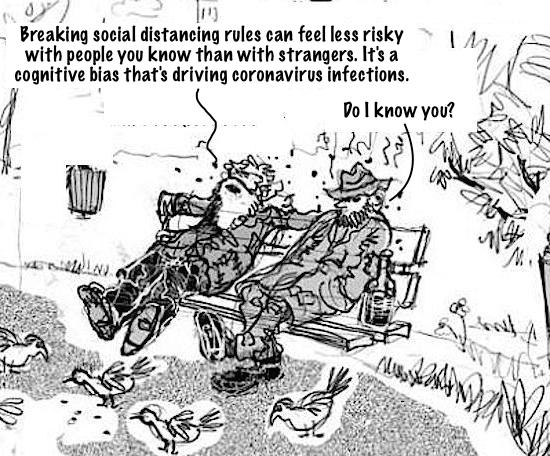Search
Recent comments
- difficult...
51 min 43 sec ago - no nukes...
59 min 49 sec ago - hairy...
3 hours 16 min ago - beaudifool....
4 hours 24 min ago - escalationing....
14 hours 40 min ago - not happy, john....
18 hours 59 min ago - corrupt....
1 day 21 min ago - laughing....
1 day 2 hours ago - meanwhile....
1 day 3 hours ago - a long day....
1 day 5 hours ago
Democracy Links
Member's Off-site Blogs
it's a risk to take...
 familiar
familiar
Passing by a coughing stranger on a sidewalk during a global pandemic or having coffee with a work friend — for most people, one of those two scenarios will sound considerably safer than the other.
We know the work friend, they know us. They don't appear unwell, and neither do we. Even if it may be risky to sit close together and remove our masks, it doesn't really feel threatening — unlike the coughing stranger.
But it's precisely those interactions between people who know each other that may be contributing to a sharp rise in COVID-19 cases.
"The real threat we often overlook and don't realize is there," says Tegan Cruwys, a clinical psychologist and researcher at the Australian National University, "is our closest networks — our family, our friends, our valued communities."
Feeling the threat of contagion may not be as palpable when we're with the people we know and like. That's not just because we prefer to spend time with them than strangers, but also because we are wired to assume our friends are less threatening.
As social creatures, when we identify with people and see them as being part of our community — "one of us" — Cruwys says, we have a sense that they are trustworthy and will act in our best interests.
That means we are less likely to perceive them as contagious, and we will be more tolerant of any symptoms they may have. As a result, we're more likely to take risks around them — sit close together, share food, or hug them.
But just because we think like that it doesn't necessarily mean the people closest to us are less risky when it comes to disease transmission, says Cruwys: "Contagious diseases don't respect those group boundaries."
Read more:
https://www.dw.com/en/a-quirk-in-human-psychology-that-helps-spread-covid-19/a-55395870
- By Gus Leonisky at 28 Oct 2020 - 6:22pm
- Gus Leonisky's blog
- Login or register to post comments
not kissing the chinese...
China: An unpopular winner in the year of the coronavirus
China has emerged as a winner in a year marked by the COVID-19 pandemic. It has contained the virus, its economy is recovering and criticism of its crisis management has faded. But relations with the West remain fraught.
China has the pandemic under control. But is that also true of the collateral damage it has suffered on the international stage? Beijing faced massive international criticism for its nontransparent conduct at the beginning of the coronavirus crisis.
In its bid to ward off the accusations, it resorted to the full range of its propaganda tools, smashing a lot of diplomatic china on the way. US President Donald Trump also did his best in this regard, among other things by coining the term "China virus."
Beijing wasn't content with a mere tit-for-tat response to Trump. Chinese diplomats used all available platforms, including Twitter and Facebook, both banned in China, to defend the Communist Party's course.
"Sweden, Britain, the Netherlands and France, for instance, noted aggressive statements on how the pandemic was being dealt with outside of China, some of which were also perceived as racist — including accusations about inefficient health care systems or cynical behavior by foreign politicians in the face of countless deaths," wrote Heike Holbig of the Hamburg-based GIGA Institute for Asian Studies in an essay entitled "From a Crisis of Health to One of Diplomacy: China’s COVID-19 Response."
Read more:
https://www.dw.com/en/china-an-unpopular-winner-in-the-year-of-the-coronavirus/a-55413717
the salami in the pizza was a sausage...
South Australia decided to enter a state-wide lockdown after learning a man with Covid-19 had lied about his link to a pizza shop, police say.
The strict six-day lockdown began on Wednesday after the state detected 36 infections, including its first locally acquired cases since April.
But the order would have been avoided if a man had told health officials he had worked "several" shifts at a pizza shop, authorities said.
He had said he was a customer there.
"To say I am fuming is an understatement," state Premier Steven Marshall told reporters on Friday.
Australia has relied on lockdowns, widespread testing and aggressive contact tracing to push daily infections close to zero.
"We are absolutely livid with the actions of this individual and we will be looking very carefully at what consequences there [are] going to be," Mr Marshall added.
But that would not include police action against the man because there was "no penalty associated with telling lies", said South Australia Police Commissioner Grant Stevens.
"This person's failure to be truthful with contact tracers means his close associates - who we understand he's had close contact with - haven't been identified and are currently in the community," Mr Stevens said.
Despite such concerns, state officials said they would lift the lockdown on Saturday - three days earlier than planned - after recording only three new cases on Friday.
Police did not identify the man, but said he worked at the Woodville Pizza Bar in Adelaide.
When asked by reporters if the shop may need extra security because of public anger, Mr Stevens said: "There are all sorts of things we are considering at this point."
The state's outbreak follows neighbouring Victoria's success in crushing a second wave of coronavirus which caused about 800 deaths.
Victoria has recorded 21 consecutive days of no cases or deaths after its capital, Melbourne, emerged from a strict four-month lockdown.
Australia has recorded about 900 deaths and 28,000 infections in total.
Read more:
https://www.bbc.com/news/world-australia-55011790
Read from top.